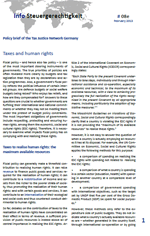Taxes and human rights
Published on Thu, 2013-02-28 13:57
"Fiscal policy – and hence also tax policy – is one of the most important steering instruments of governments. The true priorities of policies are often revealed more clearly by budgets and tax legislation than they are by declarations and action programmes. Also, a government’s fiscal policy reflects the political influence of certain interest groups. Are defence budgets or social welfare budgets being raised? Who enjoys tax reliefs, and how are they compensated for? Answers to these questions are crucial to whether governments are fulfilling their international and national commitments or whether they may not be meeting them under the pretext of budget policy constraints. The most important obligations of governments include respecting, protecting and ensuring human rights, among them the economic, social and cultural rights (ESC rights). Therefore, it is necessary to examine what impacts fiscal policy has on complying with and realising these rights." "Info Steuergerechtigkeit #08" takes a closer look at the importance of tax policies for the realization of the economic, social and cultural human rights. An emphasis is put on the obstacles and problems ins raising the "maximum available resources" at national and international levels. The paper also highlights some of the new human rights instruments being developed during the last years and gives a first glimpse into their possible meaning for the tax justice agenda. It is available also in German.
» |
SUSCRIBE TO OUR NEWSLETTER



